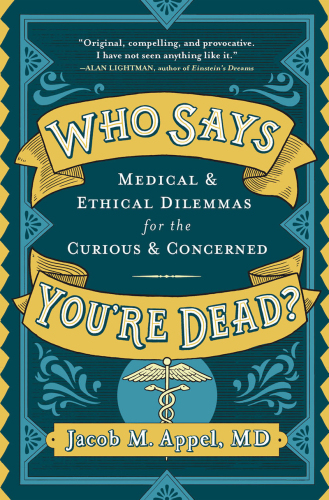
Who Says You're Dead?
Medical & Ethical Dilemmas for the Curious & Concerned
پرونده پزشکی دلمریهای اخلاقی برای نگرانی عجیب
کتاب های مرتبط
- اطلاعات
- نقد و بررسی
- دیدگاه کاربران
نقد و بررسی

September 1, 2019
How would you act when presented with medical cases that raise serious bioethical concerns? That is the question Appel (Surrendering Appomattox, 2019, etc.) poses in a series of 79 short takes drawn from news headlines, medical literature, and his own background as a psychiatrist, professor of bioethics, and director of Ethics Education in Psychiatry at Mount Sinai. The author presents each scenario in a succinct paragraph, often using an amusing name for the fictitious doctor--Jekyll, Dolittle, Hawkeye Pierce--followed by a discussion that includes current laws, regulations, or policies, which, he is quick to point out, may be nonexistent or vary from state to state. Then it's up to readers to ponder what to do. Do you tell the daughter of the father who needs a kidney transplant that not only is she not a match, but that she is not his biological daughter? Do you report to your professional society that your current patient says she slept with her former therapist? What about the corporate executive who has a brain tumor but who tells the world he is in top form when a merger is in the making? Appel notes that bioethical issues have only gotten more complex as technology accelerates--e.g., what to do with the frozen embryos of divorcing couples? End-of-life issues have gotten more complicated, as well. If nothing else, they are a reminder of the importance of establishing advance directives or living wills. Without that guidance, there can be a clash between relatives valuing the sanctity of life over those arguing for the quality of life. The result may be a quadriplegic patient permanently tied to a ventilator. Throughout, Appel's scenario approach works well, as readers are challenged to weigh the morality of decisions in our increasingly complex medical world. An easy-to-digest compendium of bioethical issues that provides plenty of food for thought.
COPYRIGHT(2019) Kirkus Reviews, ALL RIGHTS RESERVED.

October 1, 2019
Should parents have the right to stop the growth of their daughter with profound intellectual disabilities in order to better care for her? Should conjoined twins be separated in a risky procedure if one twin favors separation while the other doesn't? Physician and attorney Appel (Mount Sinai Healthcare Syst.; The Man Who Wouldn't Stand Up) explores 79 controversial ethical dilemmas. Each scenario consists of a description of the issue, followed by a "reflection," in which Appel examines the conundrum from different viewpoints and describes how doctors, bioethicists, and policymakers have handled similar situations in the past. Appel rarely offers a directive or a "correct" answer; rather, he leaves each case open-ended in the hope that it will stimulate thought and discussion. Additionally, further reading options at the end of the work provide ample resources for each reflection. VERDICT An engaging, thought-provoking, and accessible exploration of the many knotty issues that have appeared in newspaper headlines or challenged medical professionals behind closed doors.--Ragan O'Malley, Saint Ann's Sch., Brooklyn
Copyright 2019 Library Journal, LLC Used with permission.

























دیدگاه کاربران